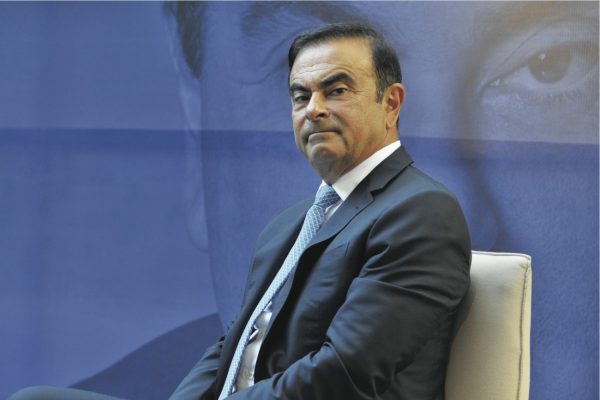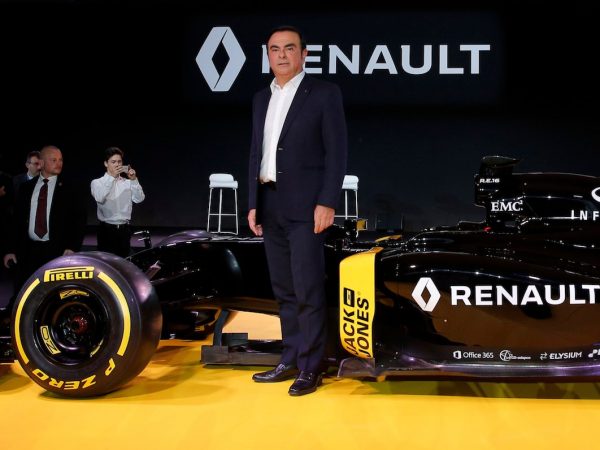 *By Thomas Schellen
*By Thomas Schellen
Carlos Ghosn, who is Brazilian-Lebanese, is the chairman and chief executive of the French automotive group Renault, chairman and chief executive officer of the Nissan-Renault Alliance, and chairman of the board at Nissan Motor Corporation. During a recent visit to Lebanon, he participated in the launch of a real-estate project that will be based in the cedars region and found a few minutes to answer questions from Executive by phone.
E Thank you for taking time to talk with Executive. In your capacity as chairman of a globally leading car manufacturing group, you’ve been interviewed about the future of cars, the art of leadership, and about transforming and running a global corporation. How do you make time in all your busy schedules to talk about Lebanon?
I obviously have very few occasions to talk about Lebanon, usually at a moment when I am taking a few days of vacation and am visiting the country. It would be fair to say that there is a lot of interest in Lebanon, its investments, economic activity, and development, and I think it’s a responsibility for anybody who is attached to this country to contribute a little bit of time to try to enlighten the public about what can be done and what cannot be done.
E It’s known in Lebanon that you have had connections to this country for many years, including consulting and advisory roles, but I understand that specifically this month there was the launch of a real estate project called Cedrar, of which you are a board member and investor.
Yes.
E Is your investment in Lebanon more of a passion investment, or does it come with a profit motive?
It’s both. The most important contribution that people of Lebanese origin who are living and working abroad can give to the country is to invest in the country. This is because investment is about job creation, about development of the country, [and] about valorizing the assets in the country, whatever these assets are: land, or quality, or anything else.
[This investment] is not about optimizing profit, because we know that there’s a lot of risk included in investing in Lebanon. The benefit of an investment contribution is very important [when] people like me, and other people, are each investing at their own level. This being said, these investments aren’t just about [making a financial] contribution, or about passion. Like any business, you want to make sure that you make a profit at the end of the day. Profitability is about ensuring that this business is going to stay and will not collapse. Profitability is ever-present in the mindset, to make sure that whatever you do, for whatever motive, the operation is sustainable.
E Do you have a specific message through this investment, above what you said before, to your peers in the expatriate Lebanese community around the world?
The only message is: Don’t listen to what I say, look at what I do. The only way in which we can help Lebanon in this difficult economic period is through investment, but [it has to be] a well thought-out, long-term investment. This isn’t a social investment. It’s a business investment, but it has to take into consideration the necessity to be long-term, involve employment [creation], and the valorization of the assets. This is the message. It’s not about lecturing anybody. It’s talking about what I do at the request of many people, and it will perhaps [inspire] some people who might be tempted to make investment but need some kind of encouragement by looking at others.
E What I saw from the information material about the Cedrar project was a description of a gated community that’s “a short helicopter ride” away from Beirut. To me, that sounds like a veiled way of saying there are many traffic problems in Lebanon.
Which is true.
E Turning, therefore, for a moment to your expertise in the automotive sector, is there any suggestion that you would have for solving the traffic problem in Lebanon?
 I think technology is going to allow for solving at least part of the problem. Autonomous cars facilitate a lot of traffic decongesting because cars are going to be driven most of the time by computers, which will optimize not only fuel consumption, but also the time to drive from one point to the other, through mapping. This isn’t only for Lebanon; this is for everywhere.
I think technology is going to allow for solving at least part of the problem. Autonomous cars facilitate a lot of traffic decongesting because cars are going to be driven most of the time by computers, which will optimize not only fuel consumption, but also the time to drive from one point to the other, through mapping. This isn’t only for Lebanon; this is for everywhere.
The second part is about infrastructure, and this is in the hands of the public sector. Necessary investments in infrastructure need to be done in order to allow not only better quality of life, but also allow the car sector to perform normally as a function of the growth of the population. Like in many other things, this is going to happen by each one doing their part. I don’t think any problem can be solved only by the public sector, or only the private sector. Each in his own area of competence is needed for this to be solved, and sometimes through consultation between the public sector and the private sector.
So, I would say traffic congestion in Lebanon will be partly solved by new technology, which is going to be very effective—not only in Lebanon, but in many cities—and through some basic investment in infrastructure to decongest some of the big traffic areas.
E This sounds like you’re in favor of the public-private partnership methodology for infrastructure development, and of the PPP law that has recently been adopted in the Lebanese Parliament.
Yes.
E From the perspective of an international investor with Lebanese roots, what do you consider to be the best assets and opportunities for investing in Lebanon?
The first asset of Lebanon is obviously its workforce. You find very good people at all levels, such as workers, engineers, [and] very good marketers. You can find these people, and if you cannot find them locally, they will come. There’s a very large Lebanese diaspora who are not [working in the country] because there is a lack of opportunities. But they are in the Gulf countries, in Europe, and in many other countries. If they have an opportunity and a decent life in Lebanon, they will come back.
Secondly, this is a country that has been built on the services sector. Lebanese people know what quality service is. I don’t say that quality of service is a given in Lebanon, but people [here] who are properly trained have the mindset and the mentality to deliver high-quality service in different sectors, whether we’re talking about health or about hospitality, and anything in these areas. I can, unfortunately, not talk about [capitalizing on] the ideal geographical positioning of Lebanon because it’s, in a certain way, handicapped by the lack of infrastructure and the lack of investment. But this [geography] would become a huge asset if we had an appropriate investments into telecommunications and all the services around 3G, 4G, etc … Unfortunately, all of this is not at the level [needed to] valorize the geographic position of Lebanon.
E To inquire more about the Cedrar project, the description emphasized respect for the cedar tree and the environment. One would assume that the project will have green buildings and will pay great attention to protecting the immediate environment.
Exactly.
E But is there also a planned aspect of rural development or job creation involved in the project, beyond the usual spinoff for the local economy in the area, which in the economic context of Lebanon is quite remote?
There is a constraint that was put by the shareholders for the people managing the project. Anything we do should be totally compatible with respect for the environment, number one, and not only respect of the existing environment, but also promote [improvements to the environment]. The management of the project announced that they made an agreement with an NGO that is in charge of replanting cedars in Lebanon. Cedrar will be supporting efforts of replanting a huge area in Lebanon with cedar trees. It’s these kinds of activities where you not only promote development that is compatible with respect for the environment, but also where you’re taking some initiatives because of this project, which will make the environment better, because the environment has been abandoned for so many years. This is at the essence of the project. This is not just about doing business, but sustainable business and sustainable business has to be done with high standards in terms of respect for the environment.
E So there is a reforestation component tied to the project?
Yes.
E Allow us to conclude with a more personal question. As CEO of an international company there can be no doubt that you have great skills in negotiation, marketing communication, and leadership. Some of these skills are often seen as characteristics for people of Lebanese descent. This brings me to ask if there are sometimes imperfect business traits that you discover in yourself and would attribute to your Lebanese heritage. What would these be, and how will you control them?
I don’t know. It’s very difficult for one person to make your own analysis about what [in your personality] is coming from Lebanese roots, what is coming from your Brazilian birth, and what is coming from your French education. Frankly, I don’t spend too much time trying to say what is coming from what, but without any doubt, part of my trading skills have their roots in Lebanon. I don’t know if it’s the good part or the bad part—that’s up to people to judge.
The Lebanese, as you know, are business people, and have been business people for such a long time. There have been great people and not so great people. You have a mixed bag of a lot of talent, which people develop with different intents. And in a certain way it is intent that makes [the usage of skills] good or bad. But I think that what is important is that, independently of the intent, the skill is there, the ability to find common ground, make agreements, and to find win-win situations. This is something that Lebanese know how to develop and, as you know, we have many examples of people who have developed these [skills] with good intent, and also unfortunately people who developed these kind of skills with bad intent.
E Is it correct to assume that you have no interest in becoming a Lebanese politician?
Exactly, I have zero interest.
*Thomas Schellen is Executive’s editor-at-large. He has been reporting on Middle Eastern business and economy for over 20 years.
Originally published in the Executive Magazine

Leave a Reply
You must be logged in to post a comment.